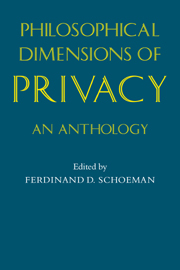Book contents
- Frontmatter
- Contents
- List of contributors
- Preface
- 1 Privacy: philosophical dimensions of the literature
- 2 Social distance and the veil
- 3 The origins of modern claims to privacy
- 4 The right to privacy [the implicit made explicit]
- 5 Privacy [a legal analysis]
- 6 Privacy as an aspect of human dignity: an answer to Dean Prosser
- 7 Privacy [a moral analysis]
- 8 Privacy, freedom, and respect for persons
- 9 Privacy and self-incrimination
- 10 Intimacy and privacy
- 11 The right to privacy
- 12 Why privacy is important
- 13 Privacy, intimacy, and personhood
- 14 Privacy: some arguments and assumptions
- 15 An economic theory of privacy
- 16 Privacy and the limits of law
- 17 Privacy and intimate information
- Selected bibliography
- Index of names
15 - An economic theory of privacy
Published online by Cambridge University Press: 12 December 2009
- Frontmatter
- Contents
- List of contributors
- Preface
- 1 Privacy: philosophical dimensions of the literature
- 2 Social distance and the veil
- 3 The origins of modern claims to privacy
- 4 The right to privacy [the implicit made explicit]
- 5 Privacy [a legal analysis]
- 6 Privacy as an aspect of human dignity: an answer to Dean Prosser
- 7 Privacy [a moral analysis]
- 8 Privacy, freedom, and respect for persons
- 9 Privacy and self-incrimination
- 10 Intimacy and privacy
- 11 The right to privacy
- 12 Why privacy is important
- 13 Privacy, intimacy, and personhood
- 14 Privacy: some arguments and assumptions
- 15 An economic theory of privacy
- 16 Privacy and the limits of law
- 17 Privacy and intimate information
- Selected bibliography
- Index of names
Summary
Much ink has been spilled in trying to clarify the elusive and ill-defined concept of “privacy.” I will sidestep the definitional problem by simply noting that one aspect of privacy is the withholding or concealment of information. This aspect is of particular interest to the economist now that the study of information has become an important field of economics. It is also of interest to the regulator, and those affected by him, because both the right to privacy and the “right to know” are becoming more and more the subject of regulation.
Heretofore the economics of information has been limited to topics relating to the dissemination and, to a lesser extent, the concealment of information in explicit (mainly labor and consumer-good) markets—that is, to such topics as advertising, fraud, price dispersion, and job search. But it is possible to use economic analysis to explore the dissemination and withholding of information in personal as well as business contexts, and thus to deal with such matters as prying, eavesdropping, “self-advertising,” and gossip. Moreover, the same analysis may illuminate questions of privacy within organizations, both commercial and noncommercial.
I shall first attempt to develop a simple economic theory of privacy. I shall then argue from this theory that, while personal privacy seems today to be valued more highly than organizational privacy (if one may judge by current legislative trends), a reverse ordering would be more consistent with the economics of the problem.
- Type
- Chapter
- Information
- Philosophical Dimensions of PrivacyAn Anthology, pp. 333 - 345Publisher: Cambridge University PressPrint publication year: 1984
- 28
- Cited by



